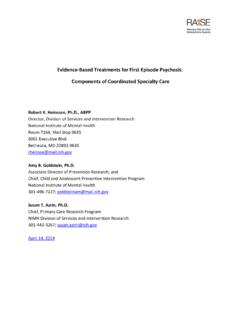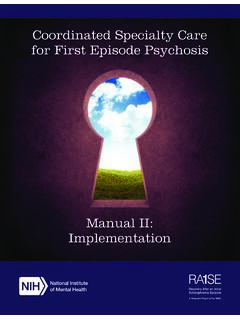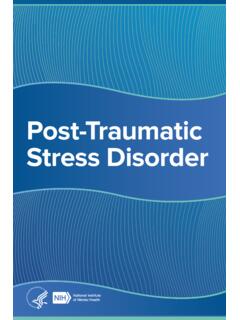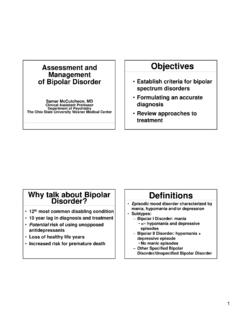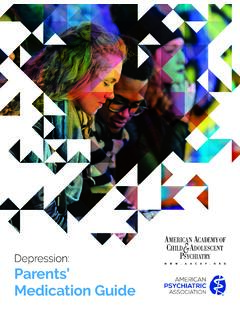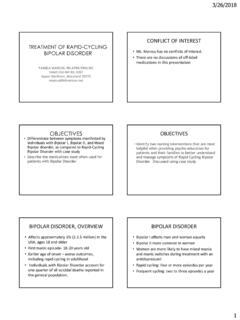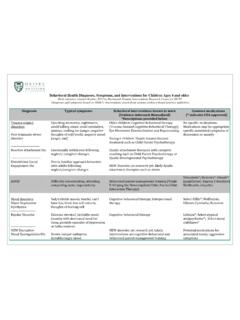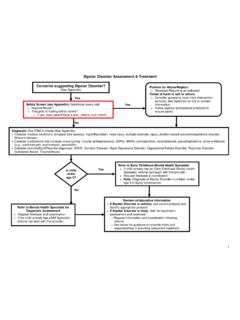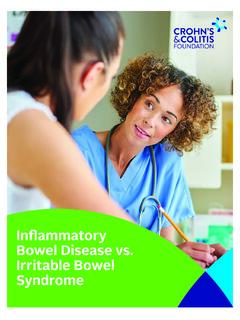Transcription of Disruptive Mood Dysregulation Disorder: The Basics
1 Disruptive Mood Dysregulation Disorder: The Basics From the NATIONAL INSTITUTE of MENTAL HEALTH. What is Disruptive mood Dysregulation disorder? Disruptive mood Dysregulation disorder (DMDD) is a condition in which children or adolescents experience ongoing irritability, anger, and frequent, intense temper outbursts. The symptoms of DMDD go beyond a bad mood. DMDD symptoms are severe. Youth who have DMDD experience significant problems at home, at school, and often with peers. They also tend to have high rates of health care service use, hospitalization, What are the signs and and school suspension, and they are more likely to symptoms of DMDD? develop other mood disorders. DMDD can be treated.
2 If you are concerned that your Children or adolescents with DMDD experience: child may have DMDD, talk to your child's pediatrician Severe temper outbursts (verbal or behavioral), on or health care provider. average, three or more times per week Outbursts and tantrums that have been ongoing for at least 12 months Chronically irritable or angry mood most of the day, nearly every day Did You Know? Trouble functioning due to irritability in more than one place (at home, at school, and with peers). DMDD is a newly classified disorder, first appearing in the Diagnostic and Statistical Youth with DMDD are diagnosed between the Manual of Mental Disorders (DSM-5) in 2013. The ages of 6 and 10.
3 To be diagnosed with DMDD, DSM is used for the assessment and diagnosis of a child must have experienced symptoms steadily mental disorders; it does not include specific for 12 or more months. guidelines for the treatment of any disorder. Over time, as children grow and develop, the Researchers at the National Institute of Mental symptoms of DMDD may change. For example, Health (NIMH) developed the DMDD diagnosis an adolescent or young adult with DMDD may to diagnose more accurately youth who may experience fewer tantrums, but they begin to exhibit have been previously diagnosed with pediatric symptoms of depression or anxiety. For these bipolar disorder (despite not experiencing the reasons, treatment may change over time, too.)
4 Symptoms needed for a diagnosis of bipolar Children with DMDD may have trouble in school and disorder). experience difficulty maintaining healthy relationships For more information on this research, visit the with family or peers. They also may have a hard time NIMH website at and search in social settings or participating in activities such as for DMDD. team sports. If you think your child has DMDD, it is essential to seek a diagnosis and treatment . For more information about diagnosis and treatment What is the difference of children and tips for talking to your health care between typical irritability provider, check out NIMH's Children and Mental Health fact sheet accessible from the Child and and severe irritability?
5 Adolescent Mental Health webpage at All children can become irritable sometimes. and Tips for Talking With Your It's a normal reaction to frustration. Children Health Care Provider fact sheet at experiencing severe irritability (as observed in gov/talkingtips. If you need help identifying a DMDD) have difficulty tolerating frustration and provider in your area, call the Substance Abuse and have outbursts that are out of proportion for the Mental Health Services Administration (SAMHSA). situation at hand. These outbursts occur more treatment Referral Helpline at 1-800-662-HELP (4357). often and are more severe than what you would SAMHSA also has a Behavioral Health treatment typically expect for children of this age.
6 Services Locator ( ). that can be searched by location. For example, a parent tells the child to stop playing a game and do their homework. Any How is DMDD treated? child might be frustrated or annoyed. But a child with DMDD may become extremely upset and DMDD is a newly classified disorder, and few DMDD- emotional and have an intense temper outburst specific treatment studies have been conducted to with yelling or hitting. A child with DMDD date. Current treatments are primarily based on experiences these intense temper outbursts a research focused on other childhood disorders few times a week. associated with irritability (such as anxiety and ADHD). Fortunately, many of these treatments also work for DMDD.
7 NIMH is currently funding studies focused on further improving these treatments and identifying new treatments specifically for DMDD. It is important for parents or caregivers to work closely with their child's doctor to make treatment decisions that are best for their child. treatment for DMDD generally includes certain types of psychotherapy ( talk therapy ) and sometimes medications. In many cases, psychotherapy is considered first, with medication added later. However, at times, providers recommend that children How is DMDD diagnosed? receive both psychotherapy and medication at the start of their treatment . If you think your child may be experiencing symptoms of DMDD, talk to your child's health care provider.
8 Psychotherapies Describe your child's behavior, and report what you have observed and learned from talking with others, Cognitive behavioral therapy (CBT) is used to help such as a teacher or school counselor. An evaluation children and adolescents learn how to cope with by your child's health care provider can help clarify thoughts and feelings that contribute to their feeling problems that may be underlying your child's behavior, depressed or anxious. CBT for anxiety often includes and the provider may recommend the next steps. exposing the child to situations that make them anxious so that they can learn to respond to those You also can ask your health care provider for a situations better.
9 Clinicians can use similar techniques referral to a mental health professional who has to teach children to increase their ability to tolerate experience working with children and adolescents. frustration without having an outburst. This therapy DMDD symptoms also can occur at the same time as also teaches coping skills for controlling anger and other disorders associated with irritability, such as ways to identify and re-label the distorted perceptions attention-deficit/hyperactivity disorder (ADHD) or that contribute to outbursts. anxiety disorders. An accurate diagnosis is vital for effective treatment . Researchers also are studying the use of dialectical Medications behavior therapy for children (DBT-C) with DMDD.
10 This type of therapy may help children learn to Currently, there are no medications approved by the regulate their emotions and avoid extreme or Food and Drug Administration (FDA) specifically prolonged outbursts. In DBT-C, the clinician helps for treating children or adolescents with DMDD. children learn skills that can help with regulating their However, health care providers may prescribe certain moods and emotions. medications such as stimulants, antidepressants, and atypical antipsychotics to help relieve your It can be effective to combine therapy for the child or child's DMDD symptoms. All medications have side adolescent with parent training. Parent training teaches effects. Monitor and report your child's side effects parents or caregivers more effective ways to respond and review the medications frequently with your to irritable behavior, such as anticipating events that child's health care provider.
